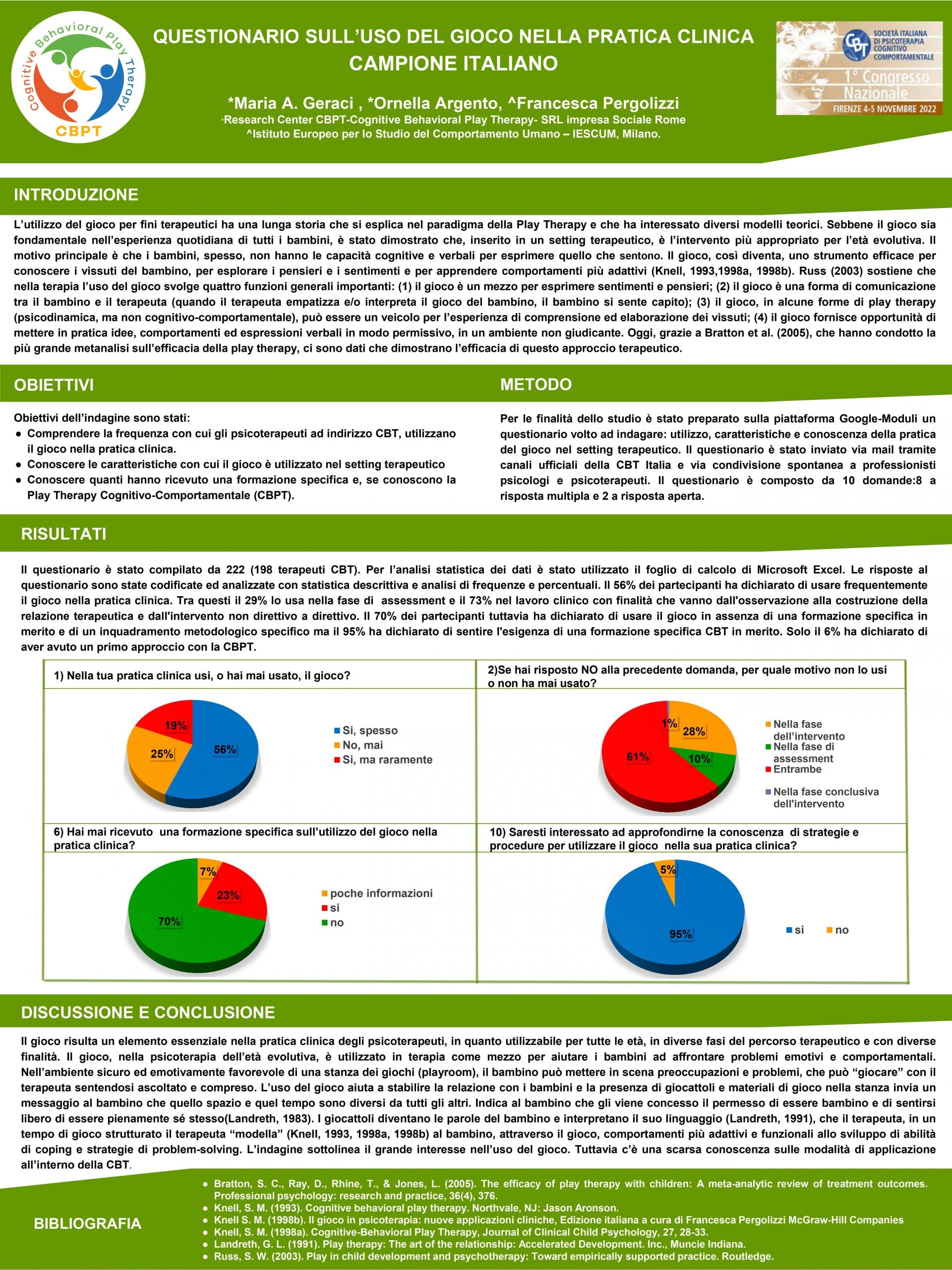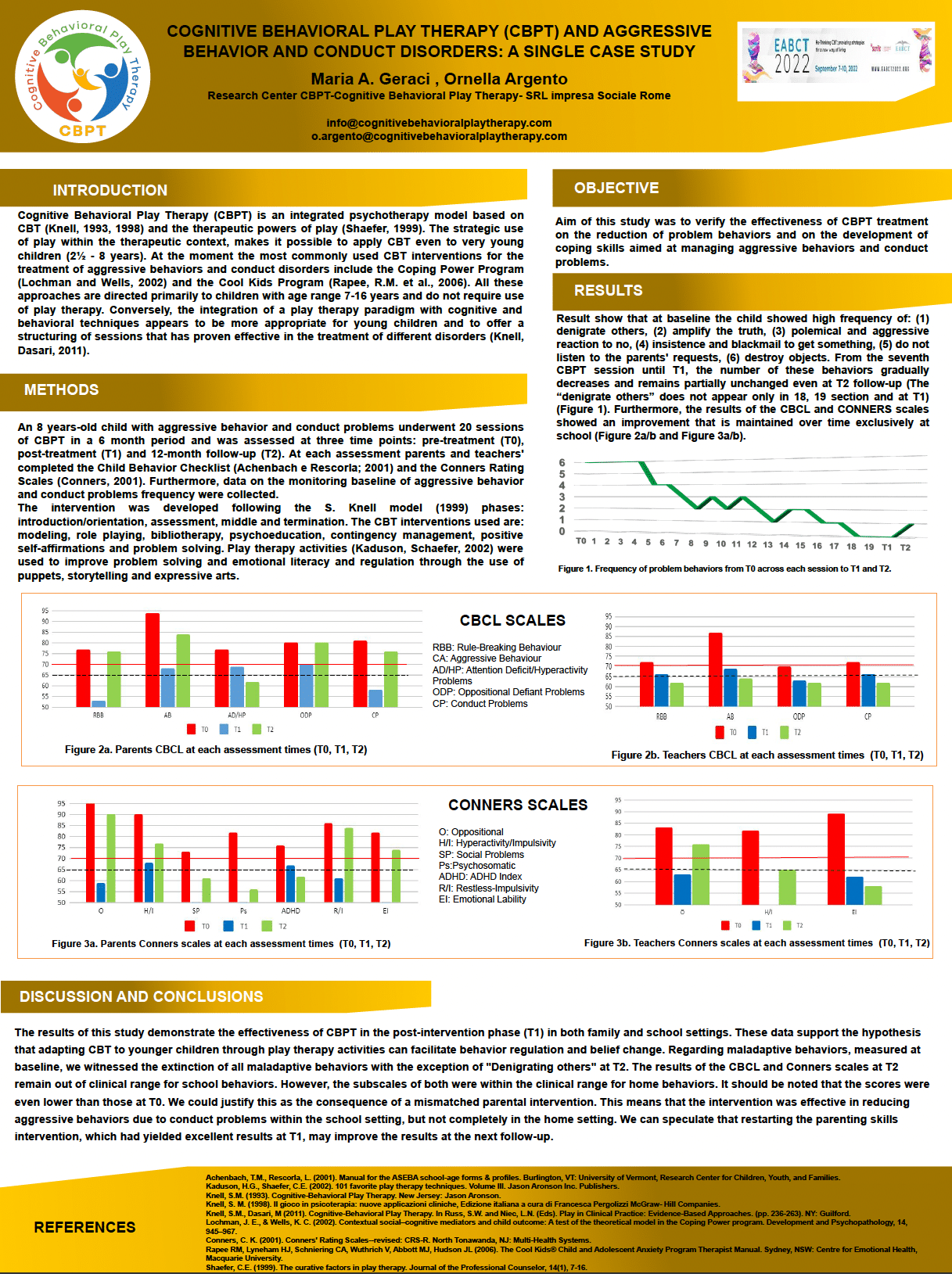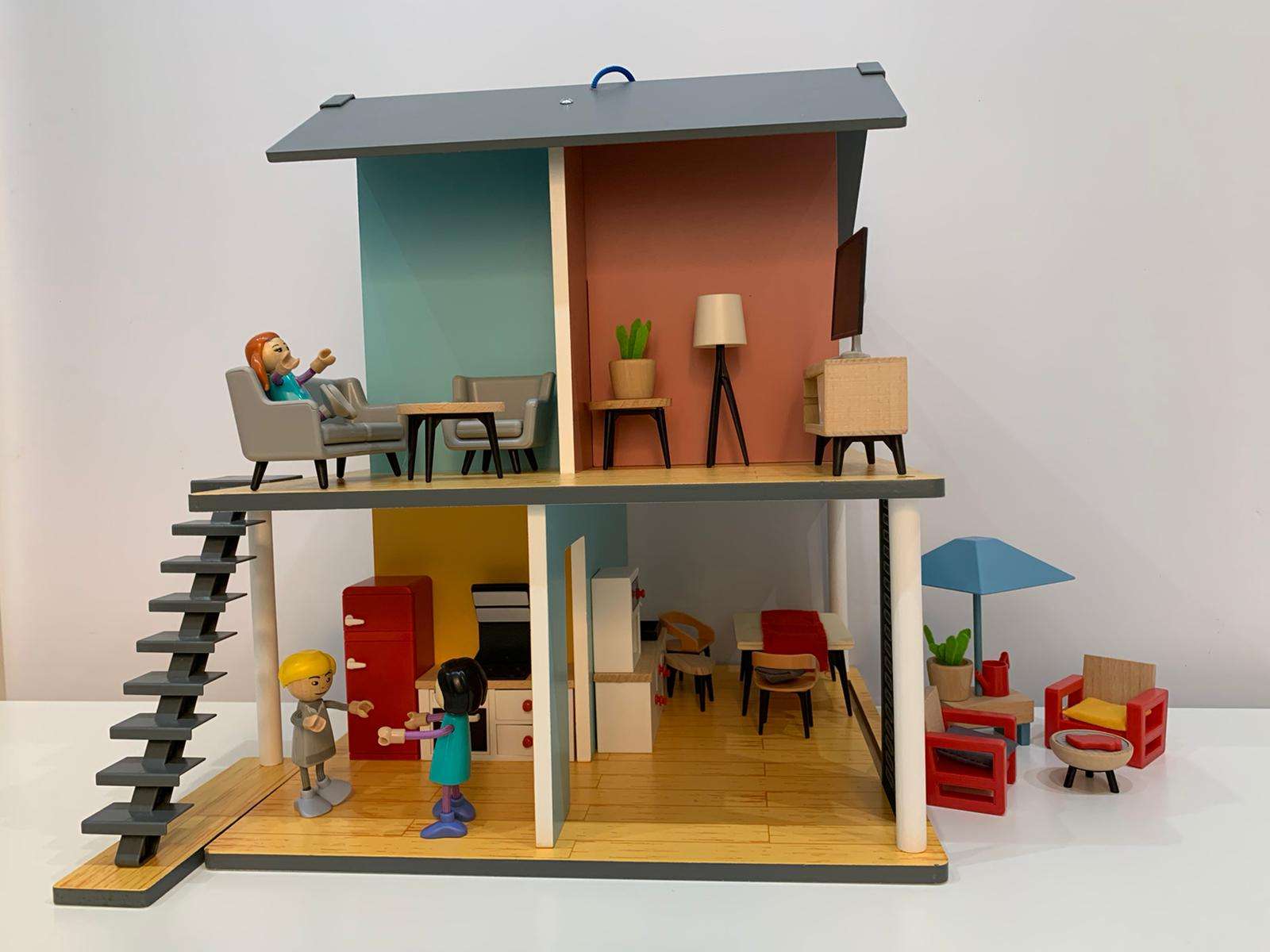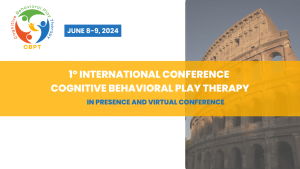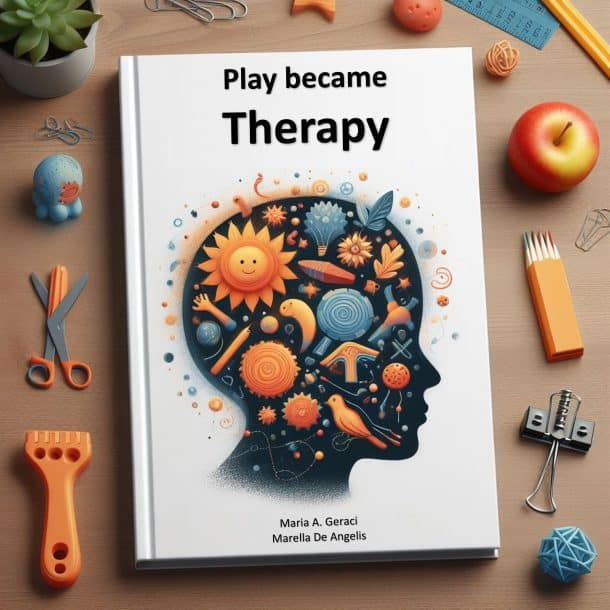ACTIVITIES
IN PROGRESS
Questionnaire on the use of play in the clinical practice of Italian psychologists.
In this paper presented at the first CBT-Italy congress, November 4-5, 2022 a survey work is carried out aimed at understanding the frequency with which psychotherapists with a CBT orientation, use play in clinical practice; to know the characteristics with which play is used in the therapeutic setting; to know how many of them have received specific training and, if they know Cognitive-Behavioral Play Therapy (CBPT).
The results of this survey showed that Play turns out to be an essential element in the clinical practice of Italian psychotherapists, especially those with a CBT orientation, as it can be used for all ages, at different stages of the therapeutic path and with different purposes. The survey underscores the great interest in the use of play.However, this survey also highlights the lack of knowledge about how play can be applied within developmental cognitive-behavioral psychotherapy.
COGNITIVE-BEHAVIORAL PLAY THERAPY AND AGGRESSIVE BEHAVIOR AND CONDUCT DISORDERS: A SINGLE CASE STUDY.
The present study presented at the EABCT 2022- 52nd European Association for Behavioural and Cognitive Therapies congress in Barcelona, Sept. 7- 10, 2022, aims to verify the effectiveness of CBPT treatment on the reduction of problem behaviors and the development of coping skills aimed at managing aggressive behavior and conduct problems.
It’s 8-year-old child with aggressive behavior and conduct problems underwent 20 sessions of CBPT over a 6-month period and was evaluated at three time points: pre-treatment (T1), post-treatment (T2) and 12-month follow-up (T3). At each assessment, parents and teachers completed the Child Behaviour Checklist (Achenbach and Rescorla; 2001) and the Conners Rating Scales (Conners, 2007). In addition, data were collected on baseline monitoring of aggressive behavior and frequency of conduct problems.
The intervention was developed following the phases of the S. Knell (1999) model: introduction/orientation, assessment, intermediate and conclusion. Play therapy activities (Kaduson, Schaefer, 2002) were used to improve problem solving and literacy and emotional regulation through the use of puppetry, storytelling and expressive arts.
The results of this study demonstrated the effectiveness of CBPT on the regulation of aggressive behaviors. Specifically, the data support the hypothesis that the adaptation of CBT to younger children through play therapy activities facilitates behavioral regulation and belief displacement, enabling the reduction of emotional-behavioral problems and the enhancement of adaptive thoughts and behaviors.
CONCLUDED
Questionnaire on the use of the “Play” in Psychotherapy
by Maria A. Geraci, Francesca Pergolizzi and Ornella Argento
A few months ago, the CBPT Research Center launched an online survey aimed at psychotherapists, including those in training, to investigate whether they use and how they use games in psychotherapy and whether they have received specific training. The survey is still active so anyone wishing to participate can still do it!
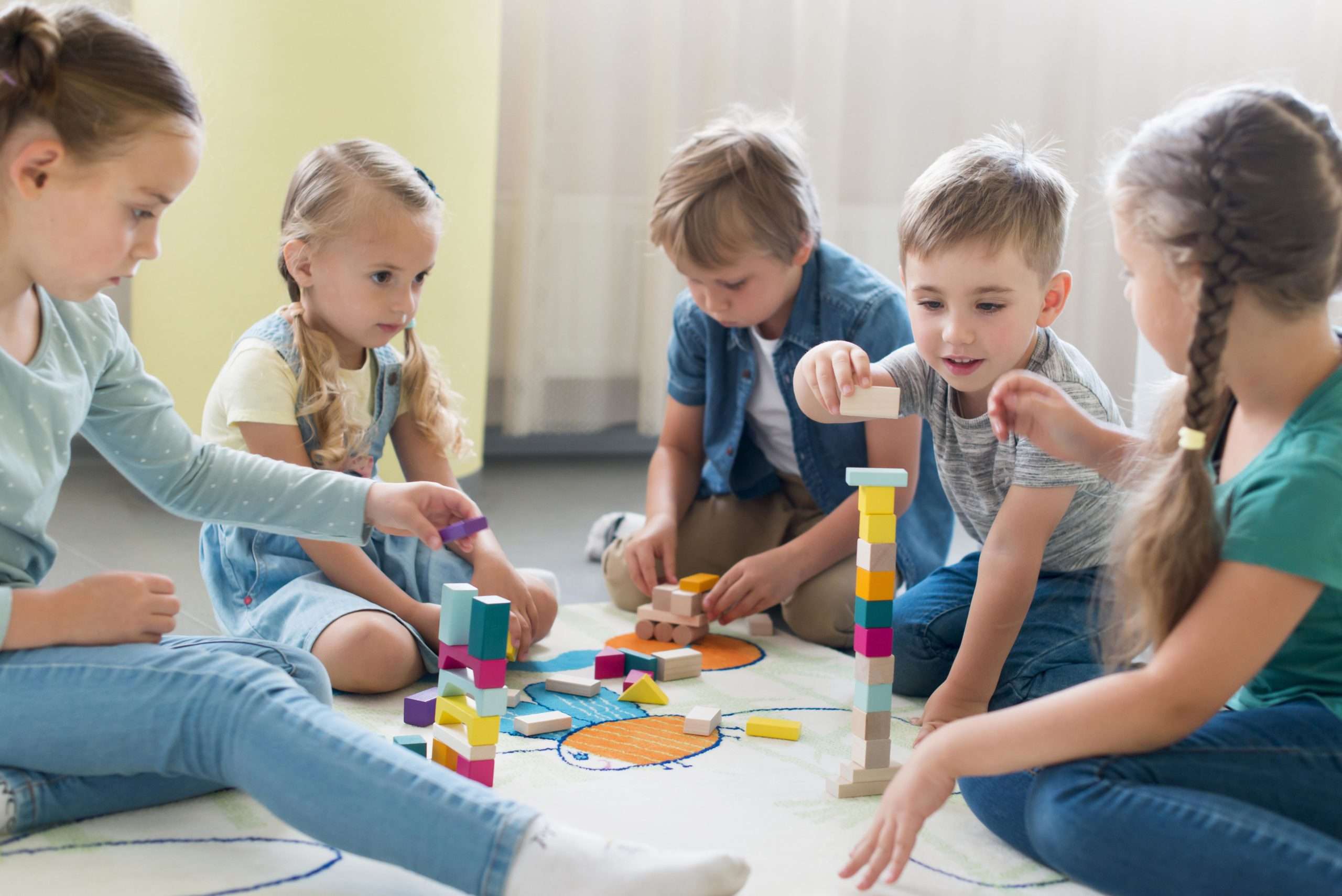
THE EFFECTS OF THE PANDEMIC ON PLAYING AND COGNITIVE-BEHAVIORAL ASPECTS IN A SAMPLE OF CHILDREN OF 3-6 YEARS
by Maria A. Geraci and Ornella Argento
In the spring of 2021 the CBPT Research Center, in collaboration with some kindergartens in the center of Rome, launched an online survey entitled “The cognitive-behavioral and playful effects of the pandemic in children”. This survey required the production and online administration of a questionnaire consisting of a general part in which questions were asked about the changes observed by the teachers in their class group following the lockdown; and a specific part in which each teacher answered questions specifically addressed to each of his pupils between the ages of 3 and 6. The questions in the questionnaire were designed with reference to the 4 main development areas: play area, neuropsychological area, emotional competence area, behavioral area. Of particular interest were the results obtained with respect to the changes observed in the game area. As the image shows, about 53% of children have shown a change in the way they play after the pandemic and this change has led to a redefinition of the preferences expressed by children. The data that emerged from this survey revealed how the recent pandemic has also had repercussions on the life and development of the little ones, forcing them to reorganize their areas of functioning and in particular their way of expressing themselves by playing.
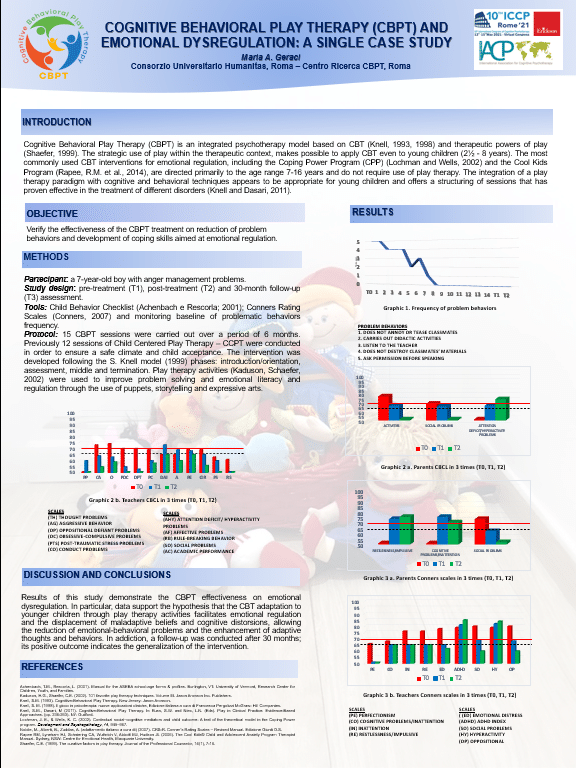
COGNITIVE-BEHAVIORAL PLAY THERAPY (CBPT) AND EMOTIONAL DISREGULATION: A SINGLE CASE STUDY
by Maria A. Geraci
The present work presented at ICCP 2021: 10th International Congress of Cognitive Psychotherapy – VIRTUAL CONGRESS, 13th-15th May 2021 aims to verify the effectiveness of CBPT treatment on the reduction of problem behaviors and on the development of coping skills aimed at emotional regulation. . This is the case of a 7-year-old boy with anger management problems. The study design: pre-treatment (T1), post-treatment (T2) and 30-month follow-up (T3) evaluation. The tools used are Child Behavior Checklist (Achenbach and Rescorla; 2001); Conners Rating Scales (Conners, 2007) and monitoring the baseline frequency of problem behaviors. The intervention protocol was structured in 15 CBPT sessions over a 6 month period. Previously 12 Child Centered Play Therapy – CCPT sessions were conducted to ensure a safe climate and child acceptance. The intervention was developed following the steps of the S. Knell model (1999): introduction/ orientation, evaluation, development and conclusion. Play therapy activities (Kaduson, Schaefer, 2002) have been used to improve problem solving, literacy, and emotional regulation through the use of puppetry, storytelling and expressive arts.

